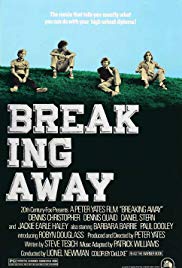COMING OF AGE
1. Why was Dave at first hesitant to go to college?
Suggested Response:
There were a number of reasons. It was new territory. It doesn’t appear that his father went to college and so Dave didn’t have models of success. But the reason that relates to the theme of the film is that it meant the break up of his group of high school friends.
2. Dave considered himself a “Cutter” despite the fact that his father was a used car salesman and Dave had never worked in a quarry. What did this have to do with Dave being an adolescent?
Suggested Response:
Dave was a “Cutter” because that meant that he was from the town and not from the college. His friends considered themselves “Cutters” and Dave wanted to be identified with them.
3. Remember when Dave said he was proud to be a “Cutter,” and his father replied, “You’re not a Cutter.” Both of them were right and both of them were wrong, but in what ways?
Suggested Response:
Dave’s father was right that no one in their family had been employed in the quarries. Dave was right in that the name “Cutter” had come to mean someone from the town rather than from the college.
4. What did Dave’s obsession with all things Italian have to do with the themes of this film?
Suggested Response:
Dave’s obsession with all things Italian exemplifies the fact that in adolescence you are choosing who you want to be and that the entire world is open to you; it was also rebellion against the cramped and dull lives of his parents.
5. Describe how the following incidents relate to the underlying themes in the film: (1) Dave’s impersonation of an Italian when he met the attractive college girl; and (2) the fact that the Italian bicycle racers cheated Dave in the race.
Suggested Response:
(1) Dave felt that being a townie (a “Cutter”) wouldn’t get him very far with the girl but also he was exploring just who he could be; adolescence is a time when a child is choosing who he wants to be; Dave was choosing to be Italian; (2) the fact that the Italian racers cheated in the race and made Dave crash his bike showed that becoming Italian was not who Dave really was meant to be; he had to be something closer to his upbringing and his friends.
PARENTING
6. Evaluate the strengths and weaknesses of Dave’s parents as they are shown in the film.
Suggested Response:
They were loving and caring but didn’t have a clue to what was going on with Dave. But this is true of many parents of adolescents and somehow parents and kids get through it. We fully believe that Dave will have a loving relationship with his parents after he matures.
7. What was the significance of the fact that Dave’s father sold used cars? In what way, if any, was this a metaphor for a more important concept that the screenwriter wanted to portray?
Suggested Response:
It was a symbol for the poverty of his family’s existence.
FRIENDSHIP
8. Name four acts of friendship that you observed in this film.
9. When the college kids beat up Cyril after he helped Dave serenade Kathy, why couldn’t Cyril and Dave tell their friends what they had been doing or that they had taken the college entrance examination? Does this tell us anything about the circumstances of their friendship?
Suggested Response:
They couldn’t tell their friends because it meant that they were leaving their friends behind and going their own way.



